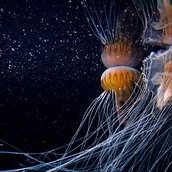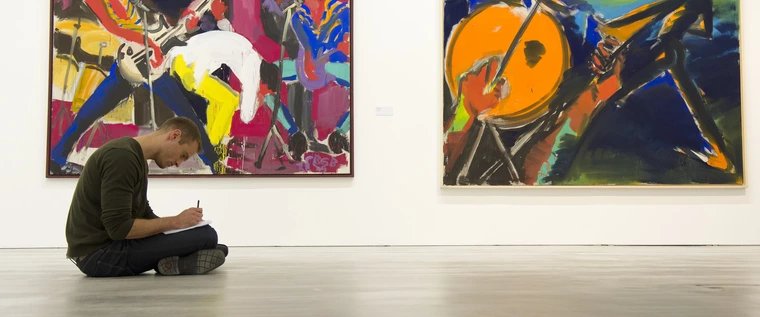
The biographical estate of Eberhardt Brucks (1917-2008) is kept at the Schwules Museum and will be presented in an exhibition starting in October. It provides a special insight into the life of a gay man who was particularly characterized by resilience: the ability to overcome difficult situations or crises and emerge stronger.
The Eberhardt Brucks Collection is the largest biographical estate archived at the Schwules Museum.
For this exhibition, curator neo seefried has taken a new look at the objects and documents from a gay life in the 20th century and connected them with contemporary artistic works, extending them into the queer present.
About Eberhardt Brucks
Eberhardt Brucks was born in Berlin-Lichtenrade in 1917 and trained from 1936 to 1938 at the Berlin Textile and Fashion School, where he studied costume and stage design. From then on, he worked as an artist for the rest of his life. In 1938, he was called up for labor and military service by the National Socialist government and was stationed in the Flak Regiment 32 in Berlin-Schulzendorf until 1945.
From 1944 to 1945, he had a relationship and pen-pal correspondence with the soldier Zdenek Bena from the Protectorate of Bohemia and Moravia (now the Czech Republic). After the war, he was a prisoner of war until October 1945. His artistic career began in 1947 with his first exhibitions and the publication of pen and ink drawings on E.T.A. Hoffmann. Due to hepatitis, he stayed in Lugano from 1947 to 1948, where he made contact with the Zurich homosexual organization “Der Kreis.”
Between 1951 and 1954, he held solo exhibitions in Berlin and Lüdenscheid and collaborated with the German homosexual press and the Hamburg publishing house Christian Hansen Schmidt. In 1952, he met his long-term partner, Hans-Joachim Pählke. From 1954 to 1961, Brucks acted at the Volksbühne in East Berlin until the construction of the Berlin Wall ended his work there. In 1963, his partner Hans-Joachim Pählke unexpectedly took his own life, and Eberhardt processed this loss through his art. From the 1960s to the 1980s, Brucks worked as a freelance graphic artist and took on small film roles until he died in Berlin in 2008.
The Collection
Acquired in 2008, the collection comprises around 15,000 individual items and bundles – including around 1,000 artistic works by Brucks, more than 2,000 photographs and slides taken by him, and almost 5,000 letters, postcards, and telegrams from and to Brucks. In addition to his work as an artist, graphic designer, and photographer, the collection also shows Brucks’ own collecting activities, from books and gray literature, autograph cards, and collectible pictures, to porcelain and his own furniture.
The Exhibition
"Strategies of Resilience" is an exhibition featuring objects from the Eberhardt Brucks Collection at the Schwules Museum, as well as artistic works by Genesis Kahveci, Florian Hetz, Sarnt Utamachote, and Rein Vollenga. A new perspective on an extraordinary gay life in the 20th century is offered and extended into a queer present: the four positions of contemporary artists connect to the resilient aspects of Eberhardt Brucks' life.
About neo seefried
neo seefried is a freelance curator, podcaster, author, cultural mediator, researcher, activist, artist, club door selector, and distribution expert.neo’s work focuses on queer life realities and the historical changes in possible narratives. neo is genderfluid and non-binary. They studied Art Education at the University of Leipzig and Art Education Curatorial Studies at the Zurich University of the Arts.
neo is a founding member of the interdisciplinary, queer collective practice ( ) s-p-a-c-e, founded in 2022, which publishes and podcasts on queer club culture in Berlin. neo has held workshops, readings, lectures, and panel discussions at various venues such as the Kunstmuseum Basel, Haus für Poesie in Berlin, Tanzquartier Wien, Hochschule für Bildende Künste Hamburg, and the LSVD.
Additional information
Opening hours:
Monday, Wednesday, Friday: 12–6 p.m.
Thursday: 12–8 p.m.
Saturday: 2–7 p.m.
Sunday: 2–6 p.m.
Tuesday: closed
Monday, Wednesday, Friday: 12–6 p.m.
Thursday: 12–8 p.m.
Saturday: 2–7 p.m.
Sunday: 2–6 p.m.
Tuesday: closed
Dates
March 2025
| Mo | Tu | We | Th | Fr | Sa | Su |
|---|---|---|---|---|---|---|
1
|
2
| |||||
3
|
4
|
5
|
6
|
7
|
8
|
9
|
10
|
11
|
12
|
13
|
14
|
15
|
16
|
17
|
18
|
19
|
20
|
21
|
22
|
23
|
24
|
25
|
26
|
27
|
28
|
29
|
30
|
31
|












